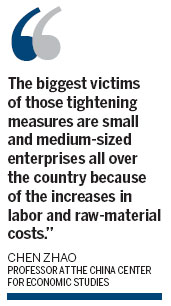SMEs face difficulty despite boost in GDP

SHANGHAI - The steady increase in gross domestic product (GDP) in the second quarter does not mean that the challenges for small and medium-sized enterprises (SMEs) are less, analysts and entrepreneurs said.
According to data released on Wednesday by the National Bureau of Statistics in Beijing, GDP increased by 9.5 percent in the second quarter compared with the same period last year, 0.1 percentage point lower than the first quarter, but still higher than what experts predicted.
"The increased rate of GDP is slightly higher than what we've expected because the GDP rate normally doesn't reflect the current economic situation, but rather the previous period," said Chen Zhao, a professor at the China Center for Economic Studies, Fudan University.
Chen said that the latest GDP figure is the result of the better economic development situation in the past two years and the current worsening economic environment will probably be reflected at this time next year.
After a series of tightening measures the government has put in place since October, including five interest-rate increases, tighter bank loans, the restrictions in real estate market, operating SMEs has become much tougher.
"The biggest victims of those tightening measures are small and medium-sized enterprises all over the country because of the increases in labor and raw-material costs and difficulty getting bank loans," Chen said.
Sun Shaoding, owner of Zhejiang Fukang Group, which provides packing services and color-printing materials, doubted that higher GDP growth reflected the actual hard times he's suffering at the moment.
"Being an enterprise in coastal cities, the labor shortage with the higher labor costs, the increased material prices and daily expenses, and the financial problems came together to make production slow and less efficient," Sun said.
Sun's company was expected to see an over 20 percent increase in profit but remained at about the same amount as last year.
"The GDP statistics probably haven't reflected the overall situation of all enterprises, especially small and medium-sized enterprises like us, which are facing severe financial problems," Sun said.
To solve the problem, more support policies were needed.
"The decrease of international orders and the 30 percent increase in labor and material costs have put enough pressure on SMEs so that the municipal government in Wenzhou encouraged companies look abroad for better opportunities," said Zheng Chenai, the chairman of Wenzhou Chamber of Clothing Commerce.
Zheng added that SMEs have to face these challenges with the tighter government policies and only the most competitive ones will survive.
Some analysts have speculated that the government might try to ease the situation in the second half of the year.
"The current economic structure is not very balanced because it pays too much attention to certain fields to benefit the State-owned companies and ignores the SMEs, especially in the allocation of bank loans," Chen said.
Chen added that SMEs should be given more opportunities by allowing private capital to enter the financial market and loosening policies to benefit all enterprises in all industries.
Ding Ningning, a research fellow at the Development Research Center of the State Council, predicted that inflation in some areas will decline and prices will fall.
"The cash flow of certain SMEs has been invested in the real estate market so I suggest that the government could encourage them to keep their focus on production instead of investing in financial products," said Ding.
China Daily
(China Daily 07/14/2011 page15)








